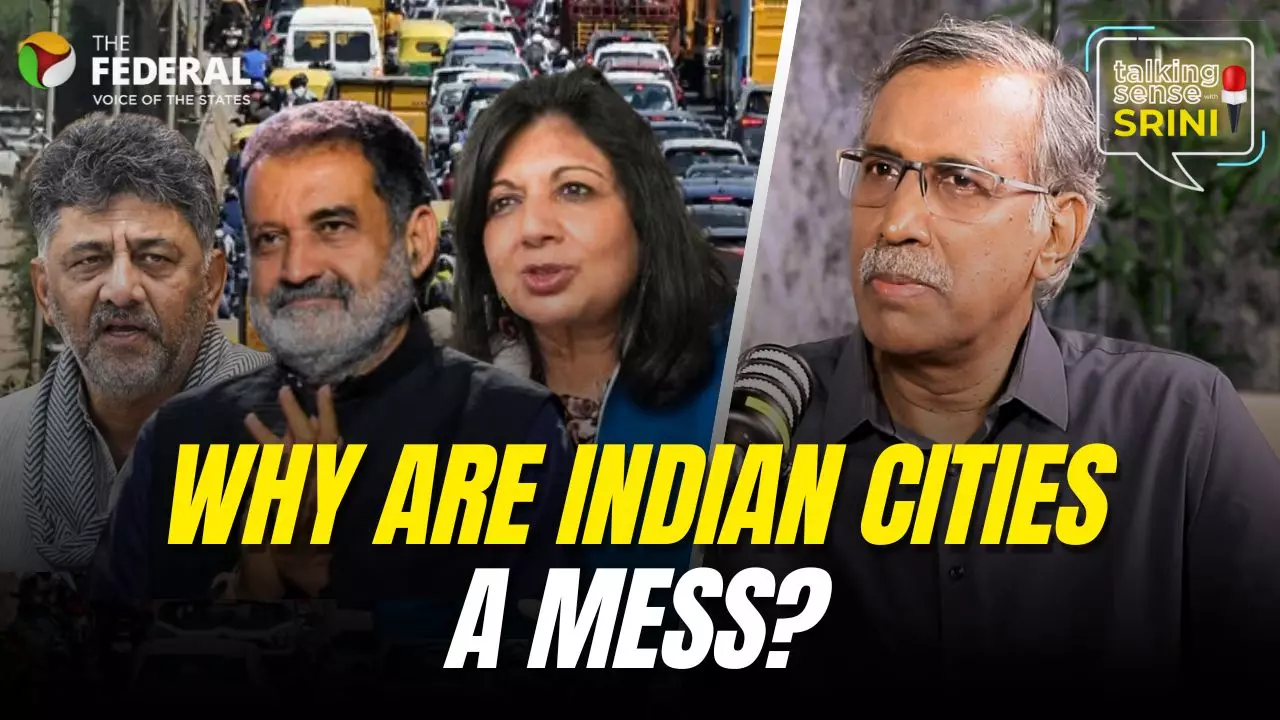
‘Chaotic growth, poor city planning not just a Bengaluru problem’| Talking Sense With Srini
Attributing crumbling infrastructure across Indian cities to decades of political, bureaucratic failures, The Federal’s Editor-in-Chief S Srinivasan says the only solution lies in structural reforms

India’s urban infrastructure is collapsing under the strain of rapid, unplanned growth — a crisis that is no longer confined to Bengaluru, says The Federal’s Editor-in-Chief S Srinivasan. Speaking on Talking Sense with Srini, Srinivasan described the meltdown in Bengaluru — which recently triggered a public spat between Biocon chairperson Kiran Mazumdar-Shaw and Karnataka’s political leadership — as symptomatic of a deeper, nationwide malaise.
The spat
Taking to X, Mazumdar-Shaw recently raised concerns over the “poor” state of roads and the garbage crisis while demanding answers from the government.
“I had an overseas business visitor to Biocon Park who said ‘Why are the roads so bad and why is there so much garbage around? Doesn’t the Govt want to support investment? I have just come from China and cant understand why India can’t get its act together especially when the winds are favourable?’” she had posted on X, tagging Chief Minister Siddaramaiah, Deputy Chief Minister DK Shivakumar, and Minister Priyank Kharge.
Also read: Kiran Mazumdar-Shaw criticises Bengaluru's garbage crisis; citizens, oppn back her
Hitting back at Mazumdar-Shaw, Shivakumar said, “If she wants to develop them (the roads), let her do it. If she comes and asks, we will give her the roads.”
Chaotic growth, poor planning
“This isn’t just a Bengaluru problem,” Srinivasan said. “Almost every Indian city is grappling with chaotic growth, poor planning, and civic apathy that’s now staring us in the face.”
He pointed to decades of political and bureaucratic failures, where “bureaucrats created their own enclaves” and politicians prioritised short-term fixes over long-term urban planning. The result, he said, is a cycle of “knee-jerk reactions” to flooding, congestion, and pollution.
Also read: Stop 'hurting' Bengaluru, says DK Shivakumar to industry leaders, amid criticism
‘Cities financially crippled’
Funding constraints, fragmented governance, and populist policies such as free utilities have left city administrations financially crippled. “Civic bodies are completely dependent on state governments for funding,” Srinivasan noted, adding that India is yet to empower city mayors or allow municipalities to fully leverage user charges or municipal bonds.
Despite contributing “60 per cent of GDP from just 3 per cent of land,” cities lack coherent governance structures. “Have you ever seen a politician lose an election for bad roads?” Srinivasan asked. “Urban issues never become electoral issues in India.”
Also read: Kiran Mazumdar-Shaw criticises Bengaluru roads, garbage; Priyank Kharge responds
‘Structural reforms need of the hour’
He called for structural reforms, including directly elected mayors with real powers. “It’s an idea whose time has come,” he said.
On the controversy over Mazumdar-Shaw’s remarks, Srinivasan urged political leaders to heed criticism instead of deflecting it. “Business leaders like Kiran Shaw and Mohandas Pai are raising real issues,” he said. “Rather than politicising it, governments should listen — because these problems are real and urgent.”

